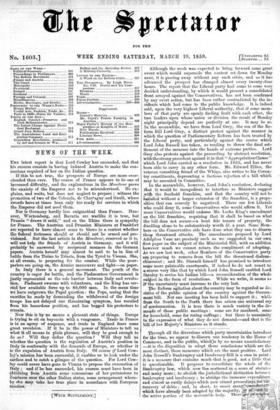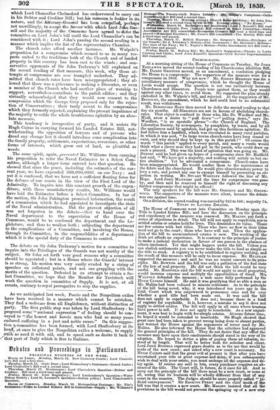Through all the diversions which party uncertainties introduce for the
time, we appear to discern one tendency in the House of Commons, and in the public, whickis by no means unsatisfactory —it is the disposition to adopt those conclusions which are the most distinot, those measures which are the most positive. Lord' John Russell's Bankruptcy and Insolvency Bill is a case in point ; it is a measure that contains much that is good, not a little that is questionable. It proposes to consolidate the whole of the Bankruptcy law, which now lies scattered in a score of statutes and many more ; to abolish the jurisdictional distinction between bankruptcy and insolvency ; to abridge the immense aspen _diturs and almost as costly delays which now attend proceed' 4a—lite. recovery of debts ; and, in short, to enact man which have already been adopted by the majority, the active portion of the mercantile body. There which Lord Chancellor Chelmsford has endeavoured to carry out in his Debtor and Creditor Bill; but his measure is feebler in its
nature, and the Attorney-General has been compelled, perhaps
not unwillingly, to accept the fiwour with which Lord John Rus- sell and the majority of the Commons have agreed to defer the
committee on Lord John's bill until the Lord Chancellor's can be considered with it ; Lord John's passing the second reading in a manner which implies the fiat of the representative Chamber.
The church rates afford another instance. Mr. Walpole's proposition for a compromise which seemed to us in many res- pects suited to the traditions both of the Church and of landed property in this country has been cast to the winds ; and con- servative opponents of Sir John Trelawny's bill explained on the second reading of that measure, this week, why those at- tempts at compromise are now trampled underfoot. They ad- mitted that church rates have been misappropriated ; they al- lowed that there was a grievance in making a Dissenter, or even a member of the Church who had another place of worship to support, nevertheless contribute to the parish edifice ; and they virtually acknowledged that they would now consent to the compromise which Sir George Grey proposed only for the rejec- tion of Conservatives ; their tardy assent to the compromises which they formerly rejected, explaining the present impatience of the majority to settle the whole troublesome agitation by an abso- lute measure.
This tendency is irrespective of party, and it assists Sir Hugh Cairns in carrying forward his Landed Estates Bill, not- withstanding the opposition of lawyers and of persons who dread any change lest it should introduce some complication into the family property, settlements, expectations, reversions, or other forms of interests, which grow out of land, as plentiful as weeds.
The same spirit, again, prevented Mr. Williams from carrying
his proposition to refer the Naval Estimates to a Select Com-
mittee, although a larger issue entered into that question. He showed that since the peace, including the estimates of the cur- rent year, we have expended 300,000,0007. on our Navy ; and yet it is confessed, that we have not a sufficient floating force for the defence of our coasts in the view of the First Lord of the Admiralty. To inquire into this constant growth of the expen-
diture, with these unsatisfactory results, Mr. Williams would have laid the Estimates before a Select Committee. In bar of the motion, Sir John Pakington promised information, the result of a commission which he had appointed to investigate the state of the Naval administration. But the gravest objection of all was not forgotten in the debate—that to hand over the Naval department to the supervision of the House of Commons, would be to confound the department and the Le- gislature, and thus to weaken both ; subjecting the department to the complications of a Committee, and involving the House, through its Committee, in the responsiblities of a department which it is the special duty of the Commons to control.



































 Previous page
Previous page